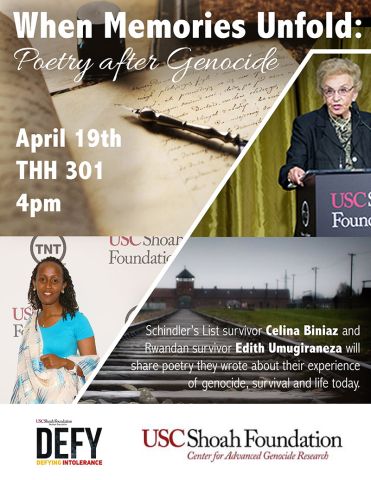
Filter by content type:
Filter by date:
A lecture by Atina Grossmann (Cooper Union, New York)
USC Max Kade Institute for Austrian-German-Swiss Studies
2714 S. Hoover St., Los Angeles CA 90070
(Parking available at the Institute or on Hoover.)
English translation: “First, I would like to thank Mr. Steven Spielberg for the brilliant idea he had to create the Shoah Foundation so that all the cruelty committed by the Nazis is never forgotten. I hope that all that we spoke about here, and all that is told about the Shoah, be just a small grain of sand in the vast mountain that should be created (formed) for the much-desired peace in the world. And all that took place in Germany and in Europe should never happen again. I would also like to say that the world should prevent Nazi cruelty from returning with all its might.

In honor of Genocide Awareness Month. join USC Shoah Foundation’s Student Organization DEFY and USC Shoah Foundation Center for Advanced Genocide Research for “When Memories Unfold: Poetry After Genocide.”
Holocaust Remembrance Day, or Yom HaShoah as it’s known in Hebrew, commemorates and honors the victims and survivors of the Holocaust. This year, people around the world will remember the victims of the Holocaust May 4-5, 2016.
A few weeks ago, a student I was interviewing for a profile I was writing on him for USC Shoah Foundation’s website said something interesting: “Growing up Jewish, the Holocaust is pretty much always there.”
I could identify. As someone who went to Hebrew school twice a week, every week, from the age of 5 to 13, the Holocaust was something I was always aware of. I was taught about it frequently, both in religious and regular school.
Pagination
- Previous page
- Page 5
- Next page